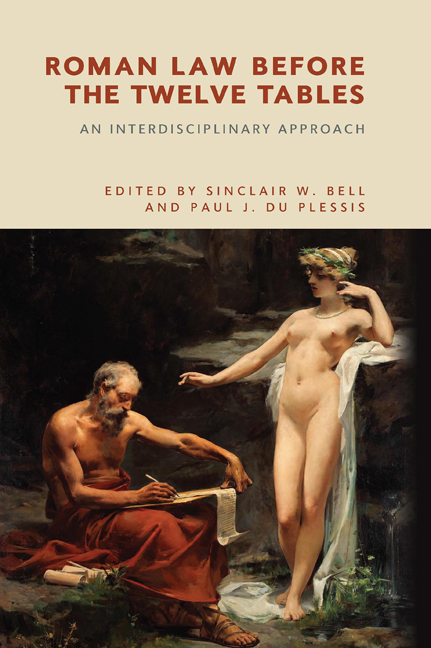Book contents
- Frontmatter
- Contents
- The Contributors
- Introduction: The Dawn of Roman Law
- Part I The Materiality of Roman Law: New Archaeological Discoveries
- 1 Roman Law in its Italic Context
- 2 Central Italian Elite Groups as Aristocratic Houses in the Ninth to Sixth Centuries BCE
- 3 Authority and Display in Sixth-Century Etruria: The Vicchio Stele
- Part II Constructing Early Roman Law: Sources and Methods
- 4 The Twelve Tables and the leges regiae: A Problem of Validity
- 5 The leges regiae in Livy: Narratological and Stylistic Strategies
- 6 The leges regiae through Tradition, Historicity and Invention: A Comparison of Historico-literary and Jurisprudential Sources
- 7 The Laws of the Kings – A View from a Distance
- 8 Beyond the Pomerium: Expansion and Legislative Authority in Archaic Rome
- Part III Roman Law in Historiography and Theory
- 9 Niebuhr and Bachofen: New Forms of Evidence on Roman History
- 10 Finding Melanesia in Ancient Rome: Mauss’ Anthropology of nexum
- Index
4 - The Twelve Tables and the leges regiae: A Problem of Validity
Published online by Cambridge University Press: 22 September 2020
- Frontmatter
- Contents
- The Contributors
- Introduction: The Dawn of Roman Law
- Part I The Materiality of Roman Law: New Archaeological Discoveries
- 1 Roman Law in its Italic Context
- 2 Central Italian Elite Groups as Aristocratic Houses in the Ninth to Sixth Centuries BCE
- 3 Authority and Display in Sixth-Century Etruria: The Vicchio Stele
- Part II Constructing Early Roman Law: Sources and Methods
- 4 The Twelve Tables and the leges regiae: A Problem of Validity
- 5 The leges regiae in Livy: Narratological and Stylistic Strategies
- 6 The leges regiae through Tradition, Historicity and Invention: A Comparison of Historico-literary and Jurisprudential Sources
- 7 The Laws of the Kings – A View from a Distance
- 8 Beyond the Pomerium: Expansion and Legislative Authority in Archaic Rome
- Part III Roman Law in Historiography and Theory
- 9 Niebuhr and Bachofen: New Forms of Evidence on Roman History
- 10 Finding Melanesia in Ancient Rome: Mauss’ Anthropology of nexum
- Index
Summary
INTRODUCTION
In modern legal systems rules of law are, generally speaking, created through legislation and broadly understood custom. Legal scholars usually envisage the laws of the Twelve Tables as the first such body of legal rules in Roman law and, therefore, as an antecessor, of sorts, to all legislated law. According to the communis opinio, the mid-fifth century BCE represented a turning point where legislation would either be invented or imported into Roman culture, with the Twelve Tables being hailed as a model. Thus, all reports of earlier legislation were written off as later annalistic inventions which retrospectively projected the situation of subsequent centuries onto the previous, formative era, which should be considered as part of the customary order, rather than the legal one. This last part of the argument is rather perplexing: for sometimes it recognises the very existence of rules of law in the Roman legal order, but instead of interpreting them as legal norms, it casts them out from the legal order on account of their alleged customary nature.
While attributing the Twelve Tables a privileged status as Rome's first statutes at the very origin of Western legal tradition might serve to buttress Roman legal scholars’ pride in the material they study, it is hardly a tenable explanation since it leaves many uncomfortable facts unexplained – most prominently, the whole of the constitutional order of the early Republic.
As far as we know, unless we are severely misled by the extant evidence, the Twelve Tables seem to focus on what we would refer to as private law. Although there are some rules related to what later would be called public law, such as the one referring to the comitatus maximus (XIIT 9.1-2), the lack of regulation of the foremost magistracies of the city is striking, especially since tradition states that the main purpose of decemviral legislation was to control the power of the consuls (Liv. 3.9). Whatever the cause for this omission, the fact remains that the most important public institutions of the early Republic do not seem to be regulated by the Twelve Tables, and tradition usually points to the earlier kings of Rome to explain their creation. The standard answer to this obvious contradiction is that this may be a later rationalisation of the role of custom in early Roman law.
- Type
- Chapter
- Information
- Roman Law before the Twelve TablesAn Interdisciplinary Approach, pp. 57 - 76Publisher: Edinburgh University PressPrint publication year: 2020



